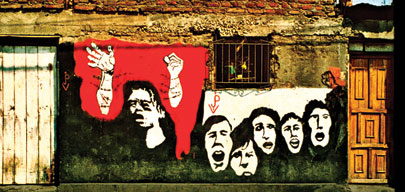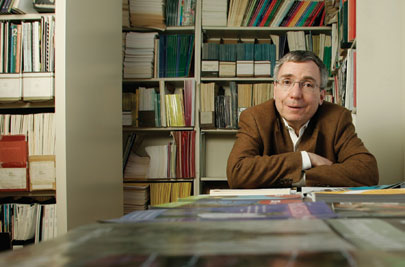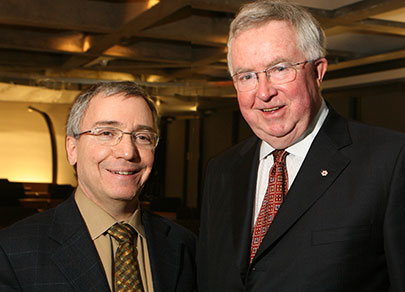By Jeff Roberts
Philip Oxhorn and the McGill Centre for Developing-Area Studies are helping strengthen emerging democracies

For Philip Oxhorn, the recent death of Chile’s former dictator Augusto Pinochet was more than just another headline. Oxhorn did graduate work in Chile during the 1980s, when Pinochet’s reign of terror gripped the nation. He saw troops tear-gas, club and shoot people in the streets. He saw families nurse their wounded, worry about their missing, mourn their dead. But Oxhorn also saw something else: a blossoming of activity among church and human rights groups that would ultimately drive out the dictator and restore democracy. He was particularly struck by how many people voiced their dissent using non-traditional activities, such as clandestinely painting vibrant anti-Pinochet murals. The lesson: “You don’t have to go to an organized protest to protest.”
“I was able to witness people’s growing awareness of the importance of democratic rule,” Oxhorn recalls, “of the importance of some kind of accountability and the necessity of a regime change. I was able to see how people became politically conscious for the first time. I realized how important it was for people to take control of their lives and to make a public statement about what was right and what was wrong at a time when it was very dangerous to do so.”
Today, as Director of the McGill Centre for Developing-Area Studies (CDAS), Oxhorn is providing new insights into such grassroots transformations. CDAS is a nexus of scholars dedicated to understanding the foundations of democratic development and the current challenges to democracy. By drawing on a broad intersection of disciplines, Oxhorn says, “the centre is bringing research and real political experience together to share ideas with the widest possible community. We’re making a bridge between academics, civil society, policy-makers, the private sector and NGOs.”

Among other projects, CDAS works at examining how local groups respond to issues related to gender, health policy and the rights of indigenous people. A particular challenge is helping these often marginalized groups join the formal political process and contribute to the long-term stability of young democracies. “You’re not going to get effective, sustainable development unless real people who stand to benefit from it also have a say in designing and implementing it,” says Oxhorn, “and in ensuring that there is accountability so the money doesn’t go off into someone’s pocket.”
The centre’s research not only serves to help empower local groups, but also proposes new means for foreign governments and aid agencies to better nurture effective democracies. At the same time, however, Oxhorn advocates a realistic perspective on what outsiders can accomplish. “We can’t do the work of civil society,” says Oxhorn. “All we can do is facilitate and find ways to help them flourish.”
Presently, CDAS comprises 35 professors and 17 grad students. Since receiving an infusion of funding from the Canadian International Development Agency (CIDA) in 2006, the centre has undertaken a number of new initiatives to share its research with those working in or with emerging democracies. An electronic journal, Foresight: Thinking About Tomorrow’s Development Problems Today, takes a long-term approach to questions about creating and strengthening democracies. This past March, CDAS hosted a conference about the challenges facing development in sub-Saharan Africa; in June, it also organized a discussion session at the International Economic Forum of the Americas/Conference of Montreal. Participants at other recent CDAS events have included the director of the World Bank’s Economics of Education program, Somalia’s Minister of State for Defence, and the president of the Nepalese Institute for Conflict Management Peace and Development. Last fall, a prominent Canadian became part of CDAS when former prime minister Joe Clark was appointed as a Professor of Practice for Public-Private Sector Partnerships.
“A lot of lip service has been paid in the past 10 years to participatory development,” says Oxhorn, “but is that really participatory? Are people really seeing their interests served? What kinds of housing policies really reach the poor? What are truly effective ways to deliver HIV/AIDS medicine?
“We’ve got expertise that agencies like CIDA can use,” he adds. “The centre’s approach to research is to collect and analyze data so we’ve got the evidence that says which best practices are really the best—and then share our research with policy-makers so they can design better policies that are more likely to succeed.”
The McGill Centre for Developing-Area Studies receives funding from McGill University and the Canadian International Development Agency.
Former PM joins CDAS

At the 2006 International Economic Forum of the Americas/ Conference of Montréal, Joe Clark participated in a panel about governance and institutional reform. Centre for Developing-Area Studies director Philip Oxhorn moderated the panel, impressing Clark with his discussion of the centre’s mission. In fact, the former prime minister of Canada and secretary of state for external affairs was so impressed that, six months later, he joined CDAS as a Professor of Practice for Public-Private Sector Partnerships.
“Canada’s active leadership on international development has been a distinguishing characteristic of both our foreign policy and our national identity,” says Clark, who recently traveled to Nigeria and the Democratic Republic of the Congo to observe those countries’ historic yet troubled presidential elections. “McGill has a strong reputation and a deep interest in those issues, and I look forward to working with students and faculty in examining ways to strengthen that essential Canadian role in the world.”
Oxhorn praises Clark as one of Canada’s most effective foreign ministers, and is thrilled to have him on board. “Over the course of the past year,” Oxhorn says, “the CDAS has undergone a major renewal with the goal to put McGill at the forefront of development studies and research, and further link our academic activities to real-world problems and problem solving. Mr. Clark’s appointment reflects that process and brings it to a new level.”
Clark is not teaching during the first year of his professorship, but has been a regular guest lecturer in undergraduate and graduate courses. In January, he gave a major public lecture, addressing what he sees as recent “troubling departures” from traditional Canadian foreign policy. He has also spearheaded several CDAS initiatives, including conferences on Africa’s development challenges and Canada’s relations with the English-speaking Caribbean.
